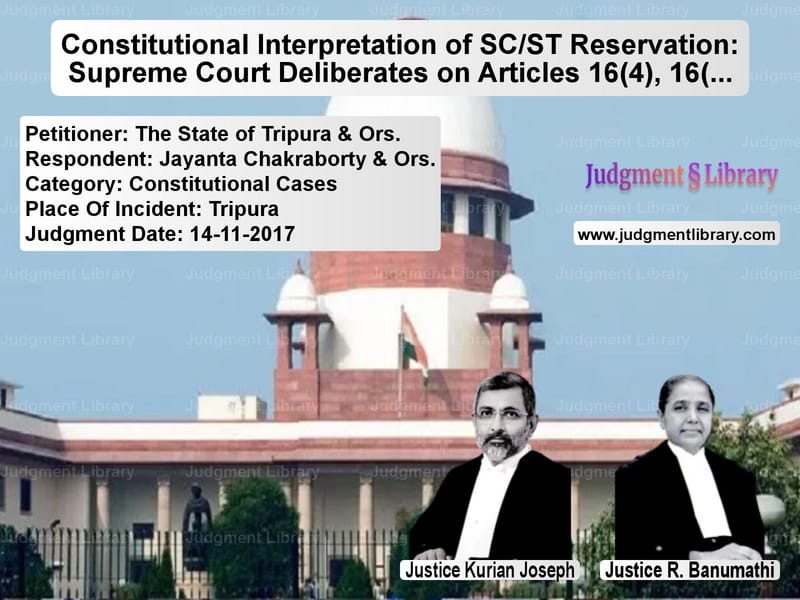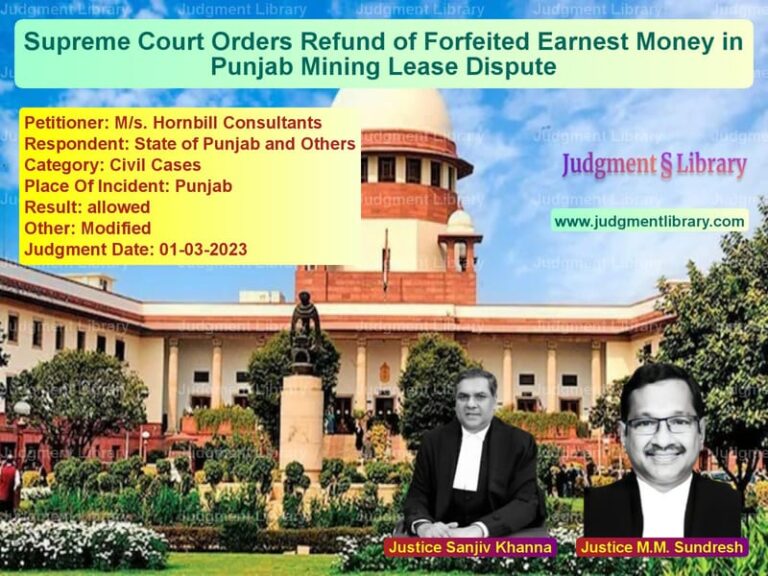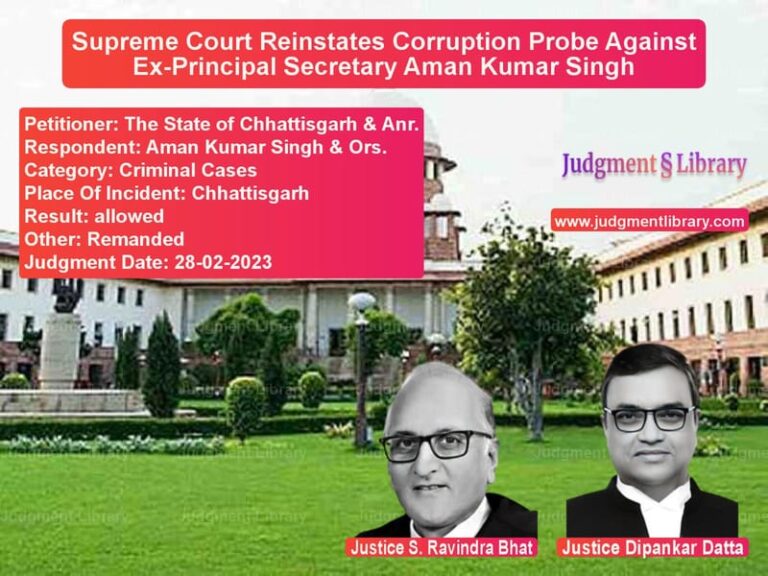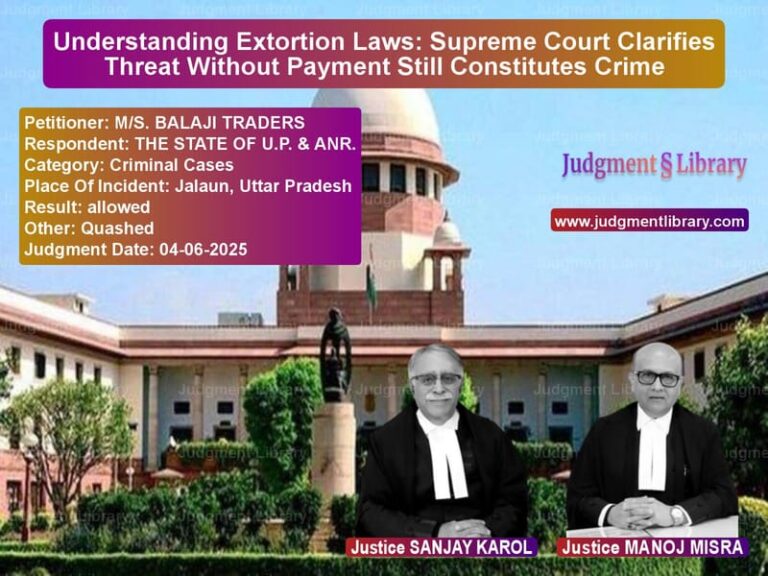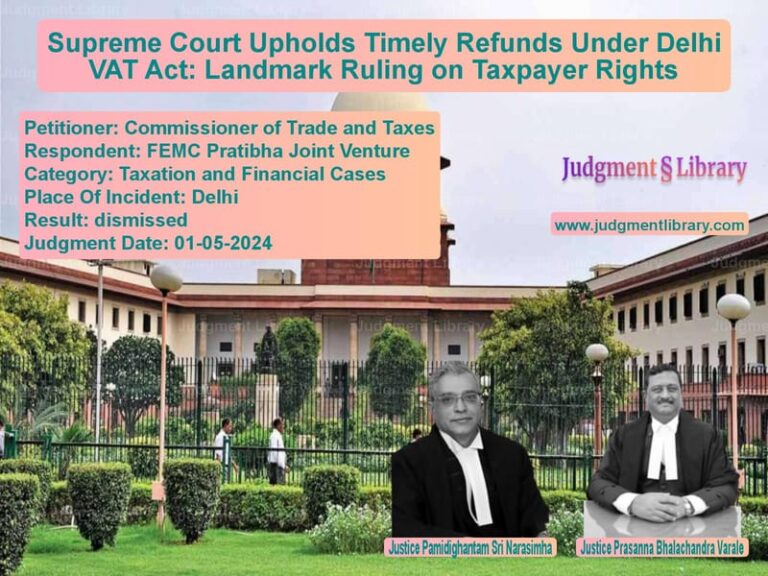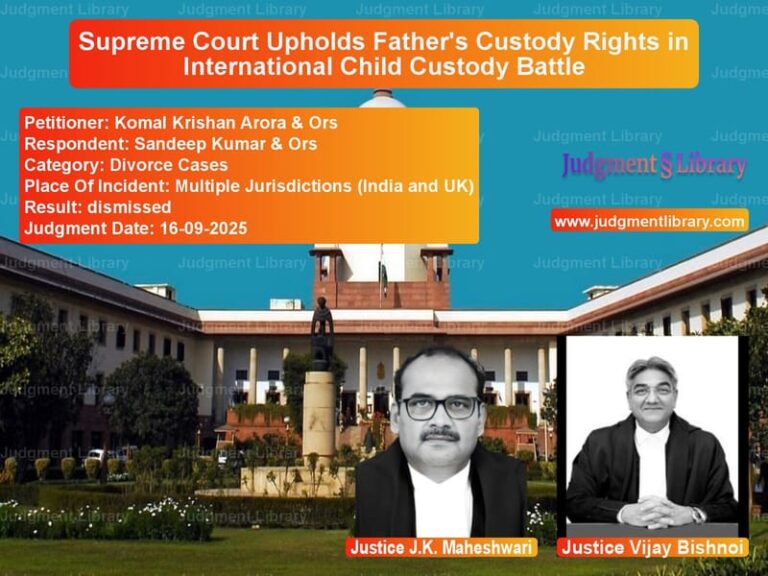Constitutional Interpretation of SC/ST Reservation: Supreme Court Deliberates on Articles 16(4), 16(4A), and 16(4B)
The Supreme Court of India has addressed the interpretation of key constitutional provisions in the context of reservation for Scheduled Castes (SC) and Scheduled Tribes (ST) in government services. The judgment in the case of The State of Tripura & Ors. vs. Jayanta Chakraborty & Ors. delves deep into the legal implications of Articles 16(4), 16(4A), and 16(4B) of the Constitution of India, with specific reference to the earlier landmark rulings such as Indra Sawhney v. Union of India, E.V. Chinnaiah v. State of Andhra Pradesh, and M. Nagaraj v. Union of India.
The petitioners have urged the Court to reconsider the interpretation laid out in Nagaraj (supra), specifically questioning whether the backwardness test should apply to SC/ST communities, especially in light of the Indra Sawhney case. On the other hand, the respondents argue that a re-look at the principles established by these judgments is unnecessary, pointing to previous decisions such as Suraj Bhan Meena v. State of Rajasthan and Uttar Pradesh Power Corporation Ltd. v. Rajesh Kumar.
Background and Key Legal Issues
The core legal issue in this case is the interpretation of Articles 16(4), 16(4A), and 16(4B), which govern the reservation of jobs for SC/ST in India. The petitioners seek a reconsideration of the ruling in Nagaraj (supra), which imposed a requirement of proving backwardness for SC/ST communities before extending the benefit of reservation. This decision, according to the petitioners, has created unnecessary hurdles for these communities in accessing government jobs.
The petitioners have made an important argument that the backwardness test is unnecessary for SC/STs as they are already recognized as backward by the Constitution. They argue that the Indra Sawhney judgment, which laid down guidelines for reservation in promotions, should be interpreted to mean that SC/ST communities should not face further scrutiny for backwardness.
Arguments of the Petitioners
- The petitioners argue that the backwardness test should not apply to SC/ST communities as they have already been recognized as socially and economically backward by the Constitution.
- They contend that the Indra Sawhney and Chinnaiah rulings establish that SC/ST communities are entitled to reservation without any further conditions.
- The petitioners also seek a reconsideration of the Nagaraj (supra) case, which requires states to prove backwardness before granting reservation in promotions.
- They challenge the idea that the creamy layer principle, which applies to other backward classes, should be applied within the SC/ST communities.
Arguments of the Respondents
- The respondents argue that the Supreme Court’s earlier judgments, such as Suraj Bhan Meena v. State of Rajasthan, should not be disturbed and that these rulings provide clarity on the application of reservation.
- They further assert that the question of revisiting the backwardness test has already been settled and that the Court should not entertain repeated challenges.
- Regarding the creamy layer principle, the respondents maintain that it is essential to ensure that only genuinely backward individuals benefit from the reservation and prevent the misuse of affirmative action.
Judicial Considerations and Constitutional Mandates
One of the critical aspects discussed in the judgment is the role of the creamy layer principle within SC/ST communities. The respondents argue that the principle of the creamy layer, which excludes more affluent members from the benefits of reservation, should also apply to SC/STs in cases where there are competing claims within these communities.
The Court also considered the constitutional mandate under Article 145(3) of the Constitution of India, which requires that matters involving significant constitutional questions must be heard by a Constitution Bench. Given the complexity and constitutional implications of the case, the Court has decided that a Constitution Bench should deliberate on these issues.
Constitution Bench Consideration
The matter will now be heard by a Constitution Bench, which will provide a detailed interpretation of Articles 16(4), 16(4A), and 16(4B). The Constitution Bench will specifically address the question of whether the backwardness test should apply to SC/ST communities and whether the creamy layer principle should be implemented within these communities.
Conclusion
The case presents a significant moment in the ongoing debate about the scope and application of reservation policies in India. The outcome of this case will have far-reaching consequences for the future of affirmative action and the treatment of SC/ST communities in government services. The Court’s decision will likely clarify the legal framework governing reservations and provide guidance on the application of backwardness criteria, creamy layer principle, and the overall entitlement of SC/ST communities to affirmative action benefits.
Ultimately, this case highlights the delicate balance between ensuring that the benefits of reservation reach the most disadvantaged sections of society while also ensuring that the principles of justice and fairness are upheld. As the matter progresses before the Constitution Bench, it will be closely watched for its impact on social justice policies in India.
Don’t miss out on the full details! Download the complete judgment in PDF format below and gain valuable insights instantly!
Download Judgment: The State of Tripura vs Jayanta Chakraborty Supreme Court of India Judgment Dated 14-11-2017.pdf
Direct Downlaod Judgment: Direct downlaod this Judgment
See all petitions in Fundamental Rights
See all petitions in Constitution Interpretation
See all petitions in Legislative Powers
See all petitions in Judgment by Kurian Joseph
See all petitions in Judgment by R. Banumathi
See all petitions in supreme court of India judgments November 2017
See all petitions in 2017 judgments
See all posts in Constitutional Cases Category
See all allowed petitions in Constitutional Cases Category
See all Dismissed petitions in Constitutional Cases Category
See all partially allowed petitions in Constitutional Cases Category

